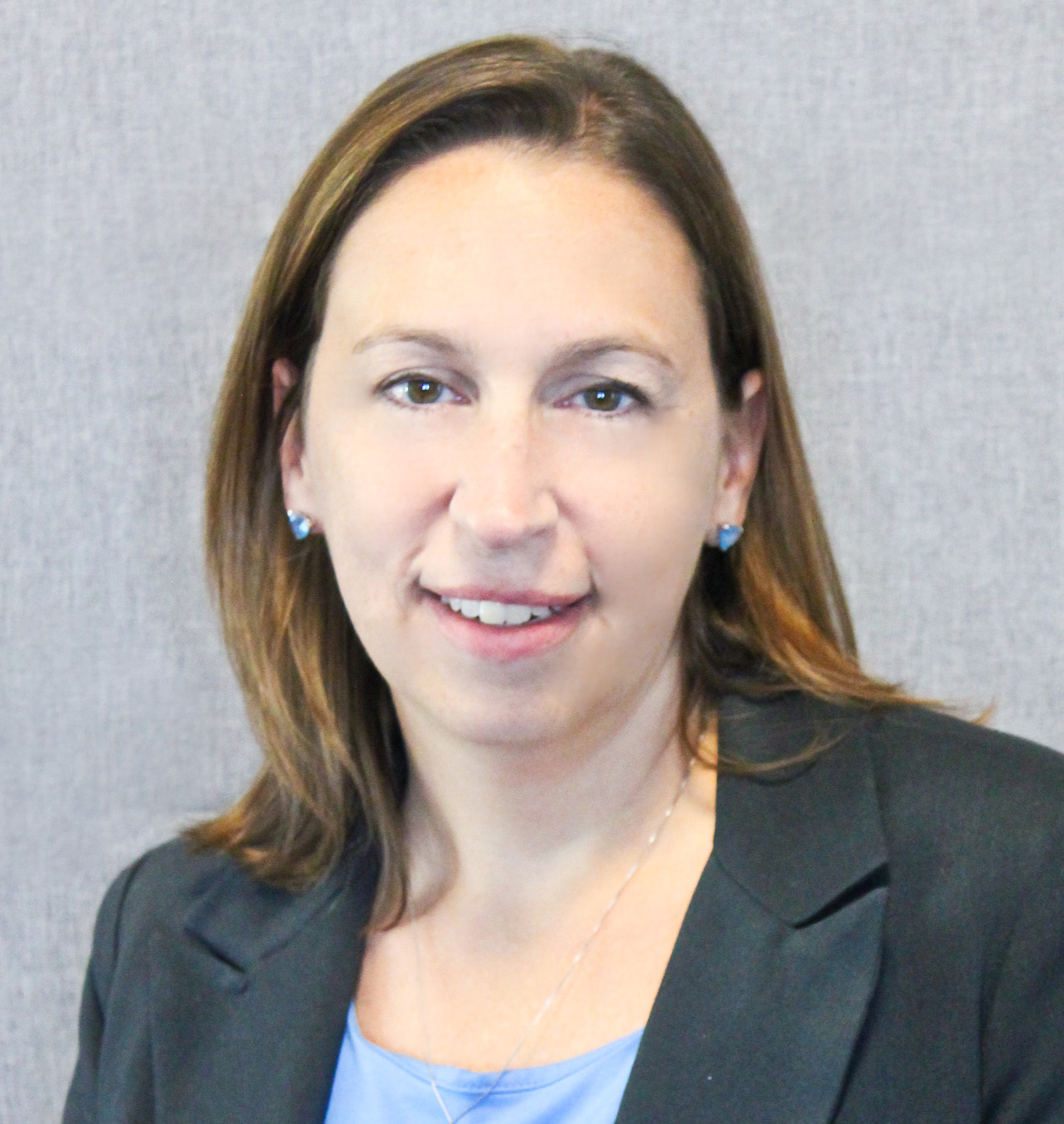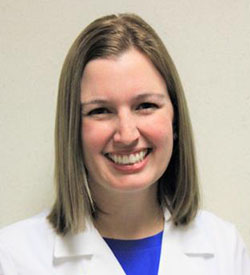Welcome to the University of Michigan Geriatric Medicine Fellowship. Since 1981, the program has trained over 155 physicians now practicing in a full range of successful careers. Led by Director Caroline Vitale, MD, AGSF, we are a one-year ACGME accredited interdisciplinary training program.
With a diverse patient population from a broad range of socioeconomic backgrounds and exposure to several models of geriatric care, our Geriatric Medicine fellowship program is one of the best in the nation. It is the ideal training experience for those physicians interested in Geriatrics, Primary Care, and/or future medical leaders, providing exposure to an integrated interprofessional approach to the care of older adults.
Fellows will work alongside our prestigious faculty and amazing collaborative teams within geriatric and palliative care. We also offer training in Palliative Medicine as well as specific training for qualified fellows interested in a master’s degree in clinical investigation.
Program Aims
- Develop compassionate and knowledgeable Geriatricians who utilize a team approach to render high-quality care to older adults.
- Cultivate Geriatric leaders within a myriad of career trajectories.
- Promoting and championing diversity and inclusion in every aspect of our program and aging.
- Facilitate and promote work-life balance and wellness within medicine.
“The absolute truth is that doing this fellowship was the best decision ever. I so much appreciate having trained at Michigan Medicine and having graduated to practice geriatrics. It is amazing to feel this sense of practice experience and confidence in my expertise. I might not like everything about my job, but I love what I do... can't thank you enough.”
DEI and Well-Being
DEI
Where We Stand
The University of Michigan is committed to a policy of equal opportunity for all persons and does not discriminate on the basis of race, color, national origin, age, marital status, sex, sexual orientation, gender identity, gender expression, disability, religion, height, weight, or veteran status.
We realize we must both acknowledge and speak out against all forms of racism, discrimination, and bias in our environments in our institutions, communities, and society. Not only is it the right thing to do but it is critically important that we in the GME community prioritize holistic and unbiased recruitment and selection of our applicants in order to ensure a diverse workforce and medical community.
What We Are Doing
Programmatic and Divisional leadership are required to attend Strategies and Tactics for Recruiting to Improve Diversity and Excellence (STRIDE) workshop. Additionally, all Faculty and Staff in the Department of Internal Medicine were required to take Unconscious Bias training, which we have continued to ensure each cohort of fellows attends annually.
In addition to opportunities to get involved with the House Officer Diversity Network and the Office for Health Equality and Inclusion, the department of Internal Medicine has developed its own Diversity, Equity, Inclusion & Well-Being committee that welcomes Geriatric trainees.
Lastly, we are committed having hard conversations and to finding the time to allow trainees to participate in events and activities that matter to them and us; supporting both diversity and inclusivity.
Well-Being

Combating burnout and improving physician wellness is vital to long-term success in the field of medicine. We promote a healthy work-life balance and provide the time and resources for trainees to be able to practice healthy habits.
- Wellness lectures incorporated into our regular Geriatric didactic lecture series. Themes include burnout, suicide prevention, empathy, and appropriate boundary setting. The program also partners with Janice Firn, PhD, MSW, a Clinical Assistant Professor in the Department of Learning Health Sciences (DLHS), to provide geriatric fellows three resiliency sessions over the course of their training on Wellness, Self-Care, and Self-Forgiveness.
- The Geriatric Program Fatigue Policy which helps to identify signs of fatigue, resources are available to help cope with stress and fatigue; the conversations about the importance of mental health and available resources to trainees start during orientation. All trainees are entitled to a paid subscription to headspace, (an app to help build healthy habits, practice mindfulness, and provide guided meditation), and our program has four weeks of vacation time, dedicated sick leave, and as a program have chosen to include work-life balance and wellness within our program aims to give wellness a place within our program that future generations in medicine will want to emulate.
- Office of Counseling and Workplace Resilience: The Office of Counseling and Workplace Resilience serves the mental and emotional health needs of Michigan Medicine faculty and staff. They provide free-of-charge and confidential counseling, consultation, coaching and stress debriefing services to help faculty and staff develop strength and resilience in their personal and professional lives. They also offer a number of programs designed to help individuals and departments reduce burnout, compassion fatigue, and to foster resilience.
- House Officer Mental Health Program: Michigan Medicine's House Officer Mental Health Program has been in existence since 1996, providing a range of mental health services to a large number of house officers in all disciplines. They are committed to supporting house officers during this significant, rewarding, and often stressful stage of life. They complete over 70 new evaluations annually, evaluating and treating a broad spectrum of mental health needs, including: depression, anxiety, sleep difficulties, ADHD, stress management, interpersonal difficulties, and work-life balance issues, to name a few.
- Facilitated Peer-Networking Sessions: Once a month our Geriatric fellows participate in a guided peer-support session, to allow for reflection and debriefing on the clinical work being done and support one another during their fellowship training.
Clinical Rotations
Rotation Overview
Hospice Rotation
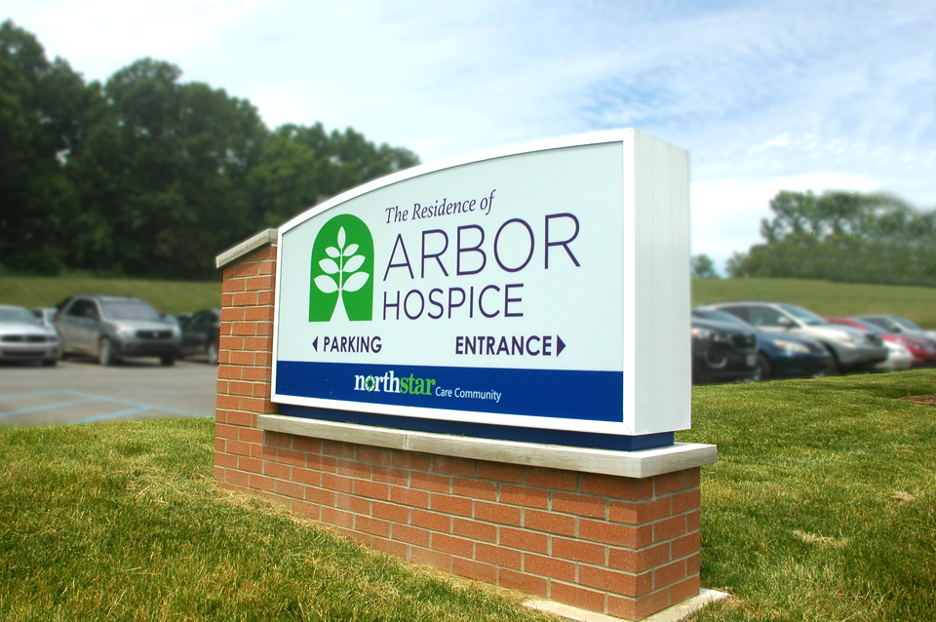
- Site: Arbor Hospice in Ann Arbor, Michigan
- Goals: Working with interdisciplinary hospice team, providing care to patients receiving home hospice services in a concurrent care model and providing end-of-life care to adults at Arbor Hospice residential facility.
- Site Director: Joseph Dixon, MD
- Duration: 2 weeks - 1 month
Geriatric Inpatient Consult Team (GICT) Rotation

- Site: University of Michigan Hospital
- Goals: Providing consultative services under the direction of the supervising geriatric attending faculty. Activities are performed in the context of a multidisciplinary inpatient team. The fellow will provide consultative care recommendations to primary teams caring for older acutely-ill medical, surgical, and psychiatric patients. GICT serves as the emergency room and observation units.
- Duration: 1.5 months
PACE Rotation
- Goals: Exposure in providing individualized care. Patients remain independent in their homes and communities while receiving the integrated social, preventive, and medical services in its own capitated systems.
- Site Director: Marjorie Almeda, DO
- Duration: 1 month
Home-Based Primary Care Rotation
- Goals: Fellows follow two veterans longitudinally via home visits over the course of the academic year.
- Site Director: Erika Manu, MD
- Duration: 2 weeks
VA Community Living Center (CLC) Rotation
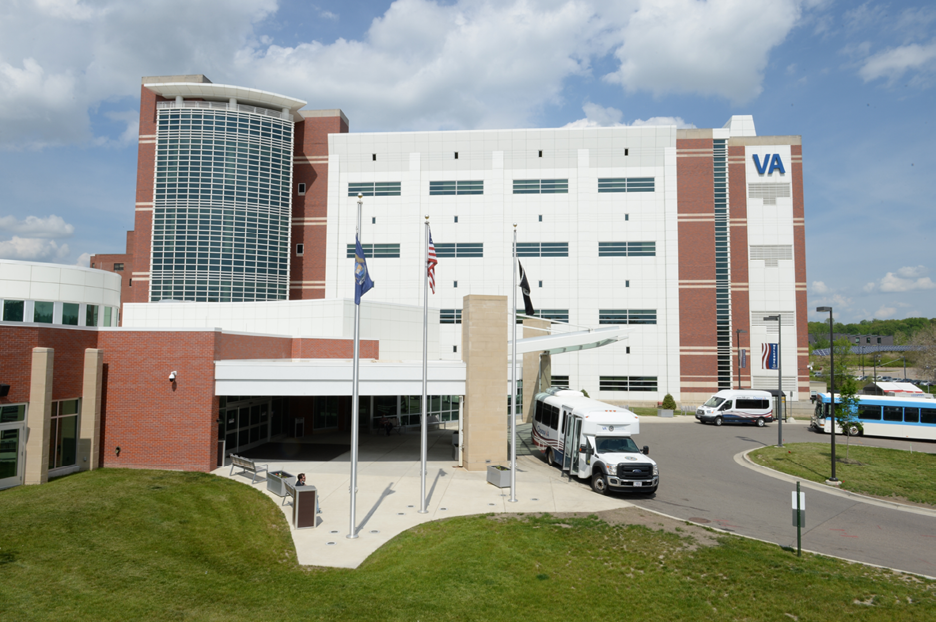
- Site: VA Ann Arbor Healthcare System
- Goals: Exposure to a consultative geriatrics outpatient clinic model who have post-acute rehabilitation needs and/or have ongoing skilled nursing needs; assessing cognitive and functional status, managing geriatric syndromes. You will incorporate input from interdisciplinary team members in formulating appropriate post-acute care and have a better understanding of the important roles of each interdisciplinary team member.
- Site Director: Caroline Vitale, MD
- Duration: 2 months
VA Palliative Rotation
- Goals: Providing care to terminally ill patients, they will be able to effectively support a patient and family through the dying process. They will understand hospice resources and become more knowledgeable in the principles of pain and system management.
- Duration: 1 month
GeroPsych Rotation
- Goals: Evaluate and treat various presentations of depression in older medically ill patients. You will provide evaluation, consultation, and management services to older medical and surgical patients in the context of clinical situations requiring geropsychiatry input.
- Duration: 2 weeks
Evangelical Home - Saline Rotation
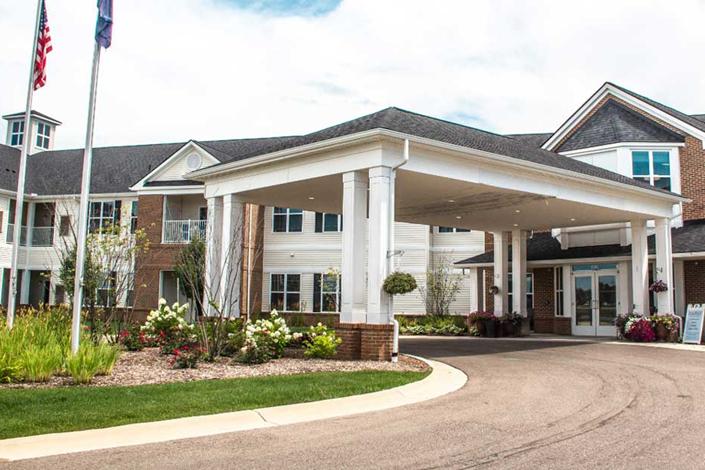
- Site: 440 W Russell St, Saline, Michigan
- Goals: Learn to become proficient in the management of post acute care and skilled nursing home patients while understanding the administrative requirements of this setting, including the role of a medical director.
- Site Director: Ana Montoya, MD
- Duration: Once a week for LTC. 1 month rotation
Long-Term Care (LTC): Will follow six long-term care residents during their clinical training. Responsible for seeing three residents once a month.
Continuity Clinic Rotation
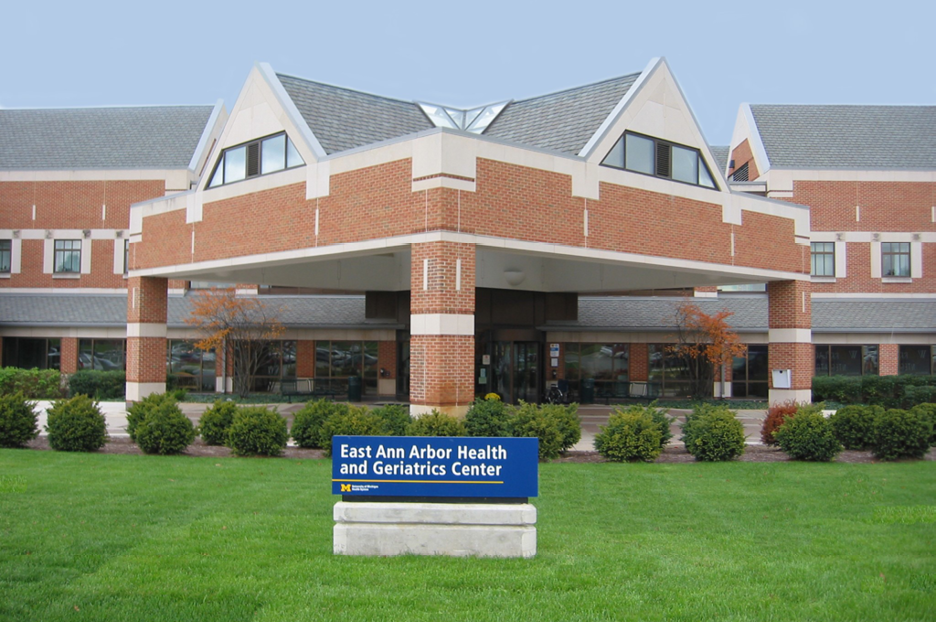
- Site: East Ann Arbor Health and Geriatrics Center
- Goals: Fellows will have one half day of geriatrics primary care outpatient clinic per week. Panel of approximately five patient visits per day promotes training in comprehensive outpatient geriatric assessment and management, complex care coordination, and function as a member of a multidisciplinary care team.
- Duration: One half day per week
Subspecialty Rotation
- Goals: Gaining exposure to multiple geriatric subspecialty clinics: Endocrinology, Mobility, Nephrology, Neurological Cognitive Disorders, Rheumatology, Osteoporosis, Neurology/ Movement, GeroPsych, and Wound Care clinics
- Duration: Two months
Elective Rotation
- Site/Faculty: Variable based on trainee request
- Options: Elective rotations offered in the following areas: Anesthesia/Pain, Cardiology, Clinical Ethics, Hematology & Oncology, Radiation Oncology, Physical Medicine & Rehabilitation, Psychiatry, Psychology. Individual electives are typically focused on trainee’s goals and may include a variety of experiences.
- Duration: One month for both adult and pediatric fellows
Scholarly Project
Both adult and pediatric fellows are required to develop a scholarly project as part of their training. Each fellow will have protected time to devote to the development of their project(s). The subject of the project will depend on the fellow's career goals, and require a faculty mentor. Examples of past projects include writing a review paper or a case report, participating in a clinical research project, or developing educational materials related to hospice and palliative medicine. Each fellow will be assigned to a faculty mentor, and encouraged to prepare abstracts, submit work for publication in peer-reviewed journals and for presentations at local, regional and national meetings.
Didactic Curriculum
- Core topic didactics: Just as the name implies, these are core topics in Geriatric Medicine covered in the Geriatrics Review Syllabus and the Geriatric Curricular Milestones. Board Review Sessions/Discussions will also be hosted during these times with reading material delegated prior.
- Trending Topics in Geriatrics: Fellows will prepare and summarize one to two geriatric-relevant studies of personal interest to them found through social media (usually Twitter), news media (such as NY Times), GeriPal blog or podcast or similar outlet.
- Case-Based Discussion and Reflection: This time may be used in a case-based small group discussion format. This environment also provides a forum for brainstorming about quality improvement and scholarly project ideas and peer feedback elicited.
- Geriatrics Clinical Conference: Essentially our version of grand rounds. Here faculty, fellows and guest speakers present on an array of relevant clinical topics that directly affect current practices as a geriatrician. This is also the platform used for Faculty Fellows Journal Club (FFJC) presentations.
Fellows will also have access to a variety of top-tier clinical and research conferences available through the Department of Internal Medicine, Michigan Alzheimer's Disease Center, and greater opportunities available through the University community. Furthermore, learners are provided with a stipend to attend one national conference, such as the annual American Geriatrics Society meeting.
Monthly Research Seminars are also available for those interested.
Additional Training
2nd & 3rd Year Fellowship Opportunities: VA Special Fellowship in Advanced Geriatrics
For physicians who have completed their clinical year of geriatric medicine, geriatric psychiatry, or palliative medicine fellowship training, there is an opportunity for up to two additional years of academic training in geriatrics. The goal of this advanced geriatrics fellowship is to develop outstanding academic and/or health care system leaders with vision and knowledge in geriatrics who are committed to leading the discipline in the 21st century.
This VA fellowship provides outstanding geriatric medicine or geriatric psychiatry research training, interdisciplinary educational opportunities, and advanced clinical and program administration learning opportunities.
Fellows have the flexibility to personalize the curriculum based on their interests, and can further their development toward careers as researchers, clinician educators, and/or medical directors.
Robert Hogikyan, MD, MPH, directs the Ann Arbor site for this program. Send questions to the U-M Geriatric Medicine Fellowship Program.
Biomedical Research Training in the Biology of Aging
With the U-M Geriatrics Center, we provide research training in the biology of aging, and how it relates to disease late in life. This NIA-funded program offers financial support and the opportunity to conduct individual research projects under the supervision of a chosen mentor. Click here for more information, and for how to apply.
Medical Education Scholars Program
Fellows also have the opportunity to participate in the University of Michigan's Medical Education Scholars Program, a 10-month program designed to further develop the teaching and leadership skills necessary for a career as a clinician educator.
Our Faculty & Fellows
Our Faculty
95% of our faculty in the Michigan Medicine Division of Geriatric and Palliative Medicine are involved in educating our fellows. To see a complete list of our faculty, click here.
Our Fellows
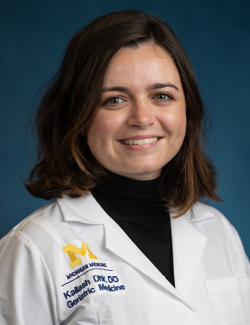
Kailash Dhir, DO
Dr. Dhir received her medical degree from Michigan State University College of Osteopathic Medicine and completed her Family Medicine residency at Aurora Family Medicine Residency Program. Dr. Dhir has an interest in practicing evidence-based medicine from a holistic and empathetic lens.
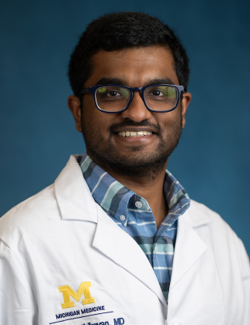
Nishok Karthikeyan, MD
Dr. Karthikeyan received his medical degree from Northeast Ohio Medical University and completed his Internal Medicine residency at Western Reserve Health Education (NEOMED). Dr. Karthikeyan has an interest working in the outpatient, inpatient, and post-acute care settings.
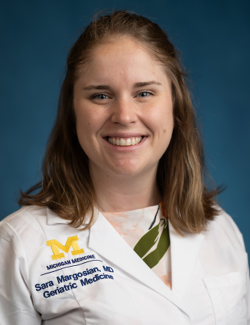
Sara Margosian, MD
Dr. Margosian received her medical degree from Oakland University William Beaumont School of Medicine and completed her Family Medicine residency at University of Michigan. Dr. Margosian has an interest in academics, teaching, and inpatient geriatric care, as well as in nursing home-based care.
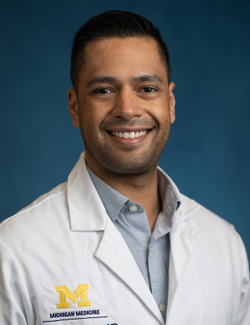
Jean-Yves Nazroo, MD
Dr. Nazroo received his medical degree from Ross University School of Medicine in Dominica and completed his Internal Medicine residency at Saint Joseph Mercy Oakland. Dr. Nazroo has an interest in outpatient Primary Care Geriatrics and SN F post-acute care.
How to Apply
The University of Michigan Geriatric Fellowship currently utilizes the Medicine Subspecialty Match, which is part of the National Residency Match Program for trainee selection. We strongly encourage applicants to submit applications through the Electronic Residency Application System (ERAS), along with all supporting documents.
Program Requirements
- Three years of Internal Medicine or Family Medicine residency at an ACGME approved institution
- ECFMG certification for foreign medical graduates
- Current curriculum vitae
- Three letters of recommendation
- Personal statement reflecting commitment to Geriatric Medicine
- No minimum USMLE score requirement, but we do appreciate receiving copies of your scores
- The University of Michigan GME utilizes the list of Medical Schools Recognized by Medical Board of California for eligibility in our fellowship program
Michigan Medicine will host all fellowship interviews virtually as the Association of American Medical Colleges (AAMC) has recommended.
We participate in J-1 visa programs, but require that you reside in the United States; we do not consider those living abroad.
Contact Us
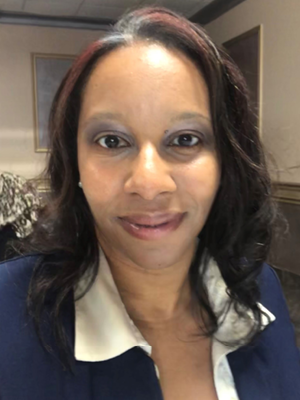
Richana Gaskin, Geriatric Medicine Fellowship Program Administrator
Email Us: [email protected]
Salary and Benefits
Learn about salary, benefits, and employment eligibility.
Discover Michigan Medicine and Ann Arbor
View the Go Blue Guide to life at Michigan Medicine.
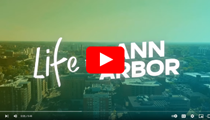


Michigan Medicine Geriatrics Center


